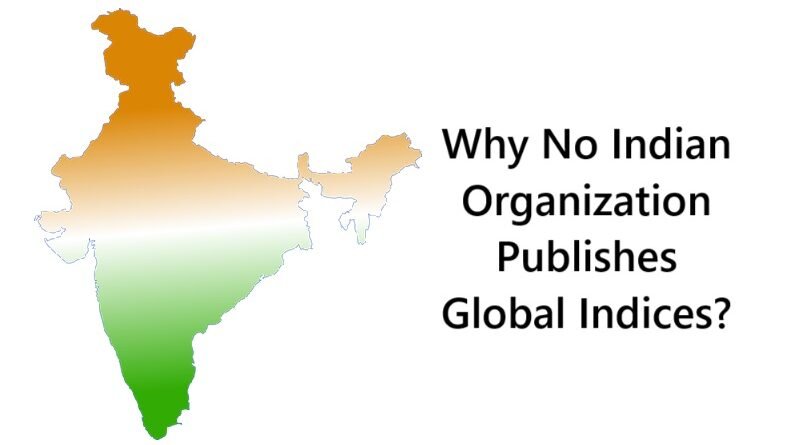Why No Indian Organization Publishes Global Indices?
Introduction
India, as one of the fastest-growing economies and a key player in global geopolitics, has a robust institutional framework that produces several national-level indices. However, when it comes to publishing globally recognized indices such as the World Happiness Index, Global Passport Index, Corruption Perception Index, or Human Development Index, no Indian organization is directly responsible for such rankings. This article explores the reasons why Indian institutions do not publish global indices and what challenges exist in this domain.
1. Dominance of International Organizations
Most global indices are published by well-established international organizations with vast networks and resources. Some of the key global indices and their publishers include:
- World Happiness Index – Sustainable Development Solutions Network (SDSN), associated with the UN.
- Global Passport Index – Henley & Partners, a UK-based consultancy.
- Corruption Perception Index – Transparency International, an international NGO.
- Human Development Index (HDI) – United Nations Development Programme (UNDP).
- Global Competitiveness Index – World Economic Forum (WEF).
These organizations have decades of experience, access to comprehensive datasets, and influence over international research methodologies. Indian organizations, on the other hand, primarily focus on national or state-level indices, leaving the global rankings to these established players.
2. Limited Access to Global Data
For an organization to publish a credible global index, it needs access to worldwide datasets that cover multiple countries with diverse economies, governance models, and socio-cultural aspects. Gathering such data requires:
- International collaborations with other governments and research agencies.
- A network of researchers across different continents.
- Standardized data collection methods to ensure fair comparisons across nations.
Indian organizations primarily work with domestic data and lack the extensive global partnerships that organizations like the World Bank or UN agencies have developed over time.
3. Methodological Challenges and Standardization Issues
Global indices rely on standardized methodologies to ensure that comparisons between countries are valid. For example:
- The Human Development Index (HDI) measures education, life expectancy, and per capita income using globally accepted benchmarks.
- The Corruption Perceptions Index relies on surveys conducted across multiple countries in collaboration with local agencies.
- The Global Competitiveness Index considers various economic factors such as infrastructure, innovation, and macroeconomic stability.
Indian organizations, such as NITI Aayog or the Reserve Bank of India (RBI), develop methodologies tailored for Indian conditions, making them less adaptable to global comparisons. If India were to launch a global index, it would require a universally accepted methodology that aligns with international standards.
4. Political and Diplomatic Considerations
Publishing a global index can have diplomatic consequences. For instance:
- If India were to publish a Democracy Index, it might rank some countries poorly, leading to diplomatic tensions.
- A Global Corruption Index published by an Indian organization might not be accepted by countries that feel unfairly judged.
- A Global Education Index created by India might not be considered neutral by international educational institutions.
To maintain neutrality, most of these indices are published by independent global organizations rather than national institutions.
5. Focus on National Indices
Indian institutions prioritize national and state-level indices to measure internal progress and development. Some of the well-known Indian indices include:
- India Innovation Index (by NITI Aayog) – Ranks Indian states based on their innovation capabilities.
- Financial Inclusion Index (by RBI) – Assesses banking and financial access.
- State Food Safety Index (by FSSAI) – Evaluates food safety standards across Indian states.
- Ease of Living Index (by MoHUA) – Measures the quality of life in Indian cities.
- Performance Grading Index (PGI) for Schools (by the Ministry of Education) – Assesses educational performance across states.
While these indices are valuable for domestic policy-making, they do not extend to global rankings.
6. Lack of Institutional Infrastructure for Global Indices
To publish a global index, an institution must have:
- Global credibility – International agencies, researchers, and policymakers must recognize the index.
- A vast data collection mechanism – This includes partnerships with foreign governments, think tanks, and NGOs.
- Transparency and neutrality – The index should not be influenced by national policies or government bias.
- Funding and resources – Conducting surveys, maintaining a global research network, and analyzing data on a worldwide scale requires substantial financial investment.
Currently, no Indian organization has the infrastructure to manage such a large-scale international index independently.
Can India Develop a Global Index in the Future?
Despite these challenges, India has the potential to create global indices in the future by:
- Collaborating with International Agencies – Partnering with UN bodies, World Bank, or WEF to develop a joint index.
- Developing a Transparent Methodology – Creating an unbiased, globally accepted ranking system.
- Expanding Research Networks – Establishing global data collection mechanisms.
- Encouraging Think Tanks and Universities – Institutions like IITs, IIMs, or private think tanks could take the lead in publishing international rankings.
Conclusion
The absence of an Indian organization publishing global indices is primarily due to data limitations, methodological challenges, diplomatic concerns, and lack of global research infrastructure. However, with India’s growing influence on the global stage, it is possible that in the coming years, Indian institutions might collaborate with international organizations to develop new global indices that offer an Indian perspective on world affairs.

